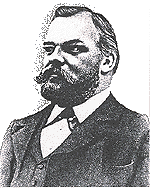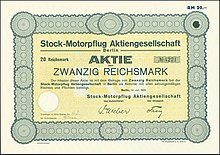Robert Stock
Carl Christian Robert Stock (born April 4, 1858 in Hagenow , Mecklenburg ; † July 13, 1912 at Gut Sophienwalde , Kolberg-Körlin district , Pomerania ) was a telecommunications pioneer and entrepreneur from Berlin .
The early years
Robert Stock was born the son of a master locksmith in Hagenow. After school he learned the trade of a locksmith in his father's workshop . Then, as was customary at the time, he went on a three-year journey as a journeyman to expand his knowledge and skills. From 1878 to 1880 Stock did his military service, where he was employed in the gunsmith's shop of his regiment . Then he returned to his father's workshop in Hagenow. During this time he worked on the construction of the central points for the Hagenow Stadt train station .
Berlin time
The Deutsche Telephonwerke
In autumn 1882 Stock went to Berlin and initially found a job as a fitter and lathe operator in Ludwig Loewe's machine tool factory in Berlin's Luisenstadt . He later moved to the Naglo brothers' telegraph construction institute, also in Luisenstadt, as a mechanic. Stock married in October 1885 and changed jobs again in 1886, this time to the Telegraphenbau-Anstalt and telegraph wire factory of Mix & Genest . In order to improve the family income, Stock and his wife accept his employer's offer to also wind lightning spindles in home work. In early 1887, Stock signed a contract with Mix & Genest for the delivery of lightning spindles and set up his own lightning spindles. Since its products were more precise and cheaper than those of the competition, Stock was soon able to supply other companies with flash spindles. As early as May 11, 1887, he was able to employ his own mechanic and founded a "company for coils, telephones and bells", Deutsche Telephonwerke R. Stock & Co. ( DeTeWe ) , in Stallschreiberstrasse . Since then, this day has been considered the day DeTeWe was founded. At the end of 1887, Stock was already employing five people; In 1888 the number of employees increased to 18. He also moved to a larger workshop on Luckauer Strasse. In order to be able to expand further, Stock took on a partner with 19,000 Reichsmarks for a capital increase in 1889 , rented two days of work in Buckower Strasse and increased the number of employees to 66. Since multiple switches for telephone exchanges had previously only been manufactured in the USA and had to be imported, he decided Stock 1891 to close this gap in the market in Germany and to produce the switches in his company. As a result, his company grew to 230 workers by 1893. Since his partner no longer wanted to bear the risk of the company's rapid growth, Stock paid him 250,000 Reichsmarks. He changed production sites again, first to Waldemarstrasse in 1892 and finally to Zeughofstrasse in 1894/1895. The DeTeWe headquarters are still located here today.
The reason for Stock's success was that he recognized the trend of the time and invested in the emerging telephone and telegraph industry. In addition, he transferred the principle of industrial mass production with very good quality, which he had got to know during his time at Julius Loewe, from the metal industry to the then still young electrotechnical industry. Furthermore, he used the employee motivation for his success. In piecework, his workers were able to achieve weekly wages of 50 Reichsmarks plus 5 Reichsmarks piecework bonus, mechanics up to 100 Reichsmarks per week. He paid his authorized signatory and development engineer Emil Bernhöft a monthly salary of 1,000 Reichsmarks. At the beginning of the 20th century, these were the highest wages in the industry. On the other hand, Stock was relentless when it came to violating work regulations. Workers arriving late were often given notice without notice.
Stock was able to use his good connections to the Reich Post Office and its director, Heinrich von Stephan , for himself. In 1893 he was able to secure major orders for the construction of telephone exchanges in Charlottenburg , Leipzig , Hanover and Stettin . In 1896 he set up a liaison office in a pavilion at the Berlin trade fair, which was supposed to introduce visitors to the secrets of telephony. As a result of his involvement in the trade fair, Stock received an order from the Reichspost to set up additional large telephone exchanges. In the following year, the constructions from Stock's fabrication prevailed against those of the competition. In 1899, Stock converted DeTeWe into a GmbH ( Deutsche Telephonwerke R. Stock & Co. GmbH ) and became a member of the supervisory board . He left the company as early as 1900.
The twist drill production
In the manufacture of telephony technology, a large number of small-diameter bores were required with high precision. In order to achieve the required quality standards, Stock first imported the drills from the USA. Since he did not want to be dependent on overseas imports, he had his own test drill milled by his former employer Julius Loewe as early as 1891. In 1893, in order to meet American quality standards, he bought two twist drill milling machines in the USA . He revised and improved these machines and was able to manufacture twist drills, so-called stick drills, for his own needs. Because of the great demand, he switched to producing drills for sale. The in-house mechanical engineering department produced the machines required for this. In 1895 Stock spun off the twist drill production into its own company, R. Stock & Co GmbH Spiralbohrerfabrik , which initially still produced at DeTeWe in Zeughofstrasse. In 1902, Stock relocated the company to Köpenicker Strasse, but sold the factory to DeTeWe in 1903 for 2 million Reichsmarks. With the sale, Stock undertook to no longer found a company that manufactures twist drills or to invest in such companies.
The cable production
Similar to the twist drills, Stock also endeavored with cables to achieve the greatest possible independence from suppliers. First, Stock had to purchase expensive cables and wires from Felten & Guillaume to manufacture the multiple switches. That is why he began to manufacture his own products in this field of business. In 1897 he was in Oberschoeneweide the R. Stock'sche cable Werke Aktiengesellschaft Oberschoeneweide building, where he will not only produce for their own use cable. The cable factory sold Stock again in 1900.
The motor plow production
After his retirement from telephone production, Stock u. a. to his Gut Sophienwalde near Kolberg (Pomerania). In order to increase the yields of his agriculture, he informed himself comprehensively about the possibilities of tillage. Since he found the steam plow in use at the time to be too cumbersome and inefficient, in 1905 he constructed a motor plow with a 6 HP internal combustion engine and 3 plowshares. In 1909, Stock received an imperial patent for the height adjustment of the ploughshare he designed. Stock engineer Carl Gleiche probably played a decisive role in the development of the motorized plow . With the so-called stick plow , the motorization of agriculture prevailed. In 1911, motor plow production began on the factory premises in Berlin's Köpenicker Strasse by Stock Motorpflug GmbH , which was soon producing two machines a day and thus becoming the market leader in the German Reich. However, the stick plow could not establish itself in agriculture. The race was won by the drag plows , which have proven themselves in North America . At the beginning of the 1920s, Stock Motorpflug was integrated into the Richard Kahn Group .
The late years
After retiring from telephone systems, twist drills and cable production, he bought numerous properties in Berlin from 1901 , e. B. Apartment buildings on Köpenicker Strasse, Wallstrasse, Andreasstrasse and Koppenstrasse. He also acquired four manors in the Brandenburg districts of Oberbarnim , Niederbarnim and Zauche-Belzig as well as in Pomerania near Kolberg. Stock named the Pomeranian estate Sophienwalde after his wife , and in 1905 it became a separate forest estate district of Sophienwalde .
Until 1894 he lived with his family at the company locations, then on Elisabethufer (today Erkelenzdamm) and from 1896 in his villa in Berlin- Treptow . At the age of only 54, Robert Stock died unexpectedly on his Pomeranian estate in 1912 as a result of a heart condition. His opulent wall grave with a bronze statue of a resting blacksmith by Gerhard Janensch and the motto work is the citizen's adornment, blessing is effort prize is located in the Luisenstadt cemetery in Berlin-Kreuzberg .
Aftermath
Streets in Hagenow, Schwerin and Ahrensfelde in Brandenburg were named after Robert Stock .
The Robert-Stock-Gymnasium in Hagenow has also had his name since 1999.
literature
- Dieter Leuthold: The type of innovative and inventive entrepreneur around the turn of the century: the example of the Berlin entrepreneur Robert Stock. In: Hans-Heinrich Bass (Ed.): Facets of economic research. Festschrift for Karl Marten Barfuß . Lit Verlag, Münster 2004, ISBN 3-8258-7441-9 , pp. 39-52.
- Berlin monthly magazine. Edition Luisenstadt. Issue 11, November 1995, pp. 30-38.
Individual evidence
- ↑ www.landtechnik-historisch.de: Stock Motorpflug AG accessed on December 6, 2018
- ^ Robert-Stock-Gymnasium, Hagenow . In: lehrer-in-mv.de, accessed on April 29, 2020.
| personal data | |
|---|---|
| SURNAME | Floor, Robert |
| ALTERNATIVE NAMES | Stock, Carl Christian Robert (full name) |
| BRIEF DESCRIPTION | Telecommunications pioneer and entrepreneur from Berlin |
| DATE OF BIRTH | April 4, 1858 |
| PLACE OF BIRTH | Hagenow , Mecklenburg |
| DATE OF DEATH | July 13, 1912 |
| Place of death | Gut Sophienwalde , Kolberg-Körlin district |



